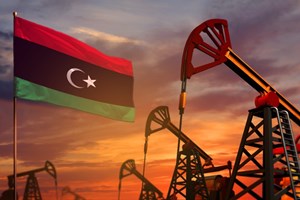Global market at risk of losing 1 MMbpd on Libyan oil production shutdown crisis
(Bloomberg) – Libya’s oil production has more than halved this week — and risks taking close to 1 MMbpd off the global market — as the country’s fields reduce operations amid a stalemate over who controls the central bank.
Output has dropped to about 450,000 bpd since eastern authorities on Monday ordered a shutdown of all production, according to people with knowledge of the situation. Cuts or shutdowns include at Waha Oil Co., Sarir, and oil supplying the Ras Lanuf terminal.
The country was pumping 1 MMbpd before Monday’s order, and the vast majority of production is located in the east.
The move by eastern authorities to freeze all production and exports came in response to a decision by the internationally recognized government in the west to replace central bank Governor Sadiq Al-Kabir. Al-Kabir, who has allies in the east, has refused to step down from the sensitive post where billions of dollars of oil revenues are managed among the two governments.
The shutdowns are escalating a crisis the United Nations has warned runs the risk of collapsing the economy. The supply threats in the country have also helped support crude prices recently, though Brent futures edged lower on Wednesday.
Production curbs include:
- At Waha Oil Co., where output has dropped to 175,000 bpd from 320,000 bpd.
- Sarir, operated by Arabian Gulf Oil Co. and which was producing 145,000 bpd, has now shut down.
- Oil supplying the Ras Lanuf terminal dropped at least 130,000 bpd.
- The 70,000 bpd Al-Feel oil field was shut down Tuesday.
- The largest oilfield, Sharara, had already shut down earlier this month.
Competing governments. Libya was split into competing eastern and western governments a decade ago, and stewardship of the monetary authority gives control of billions of dollars of revenue. Its energy resources have been a key battleground for factions vying for political advantage, bringing frequent stoppages.
The central bank stalemate is the latest episode in the Libyan conflict that threatens a 2021 United Nations-backed political arrangement which ended the war between the rival camps and was supposed to bring them together after elections which never happened, leaving room for tensions.
The OPEC member — which sits atop Africa’s largest oil reserves — was producing 1.27 MMbpd day of oil on Aug. 1, according to figures from the state oil firm National Oil Corp., before the 300,000 bpd Sharara field was shut down.



